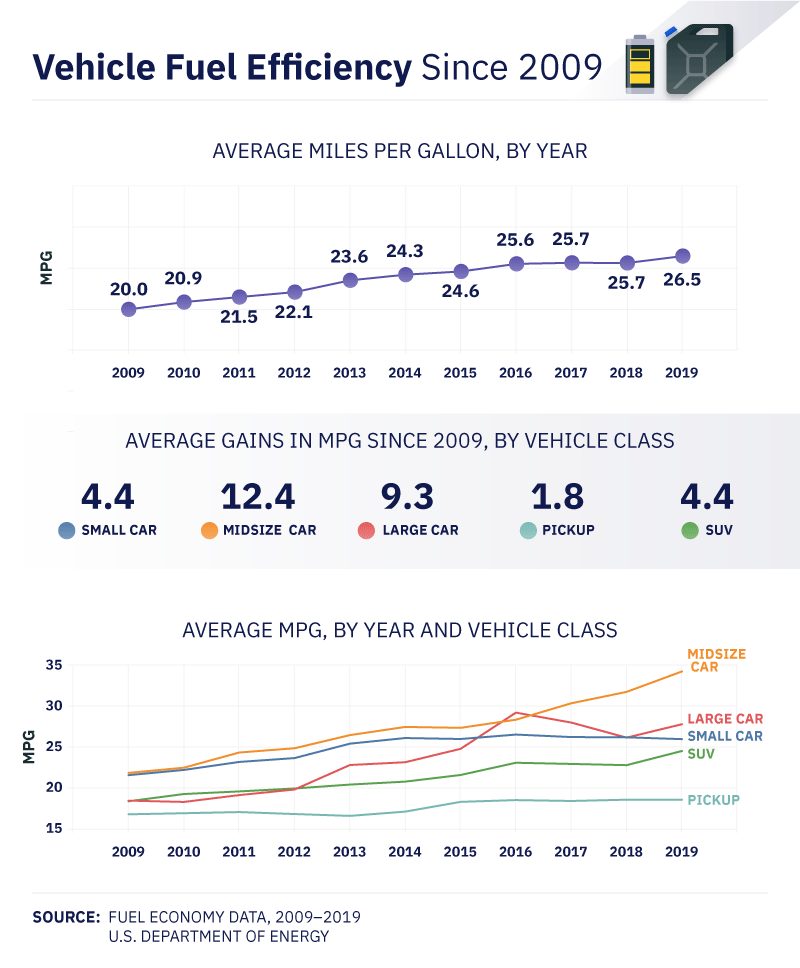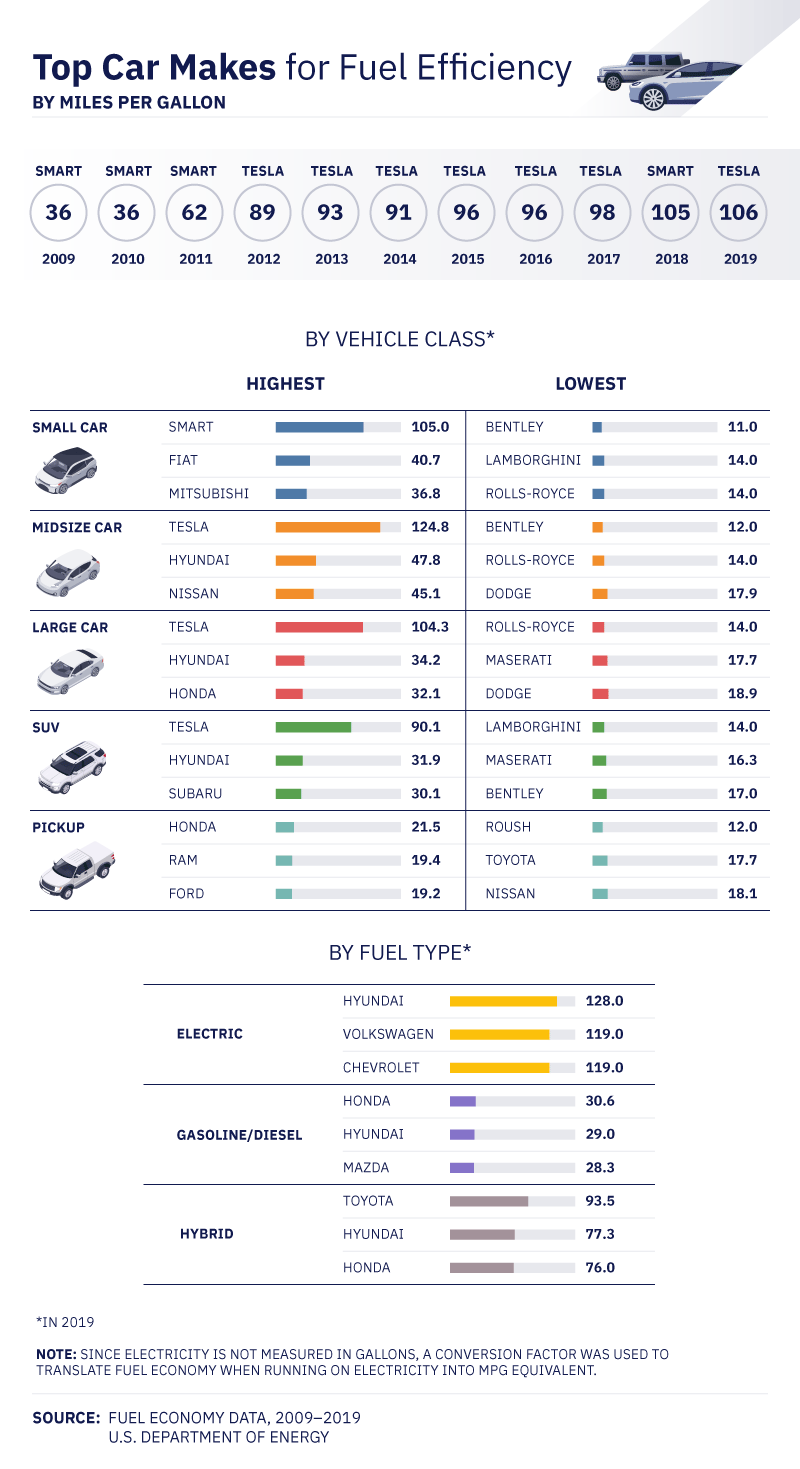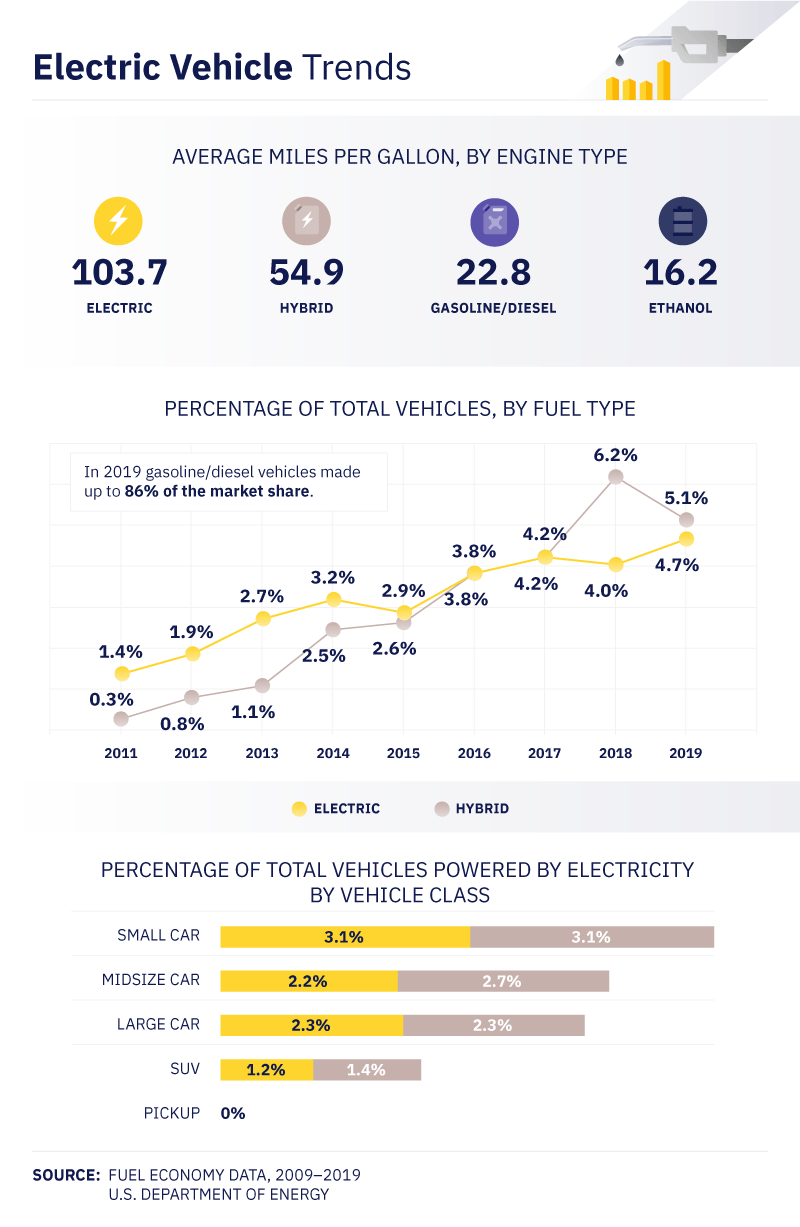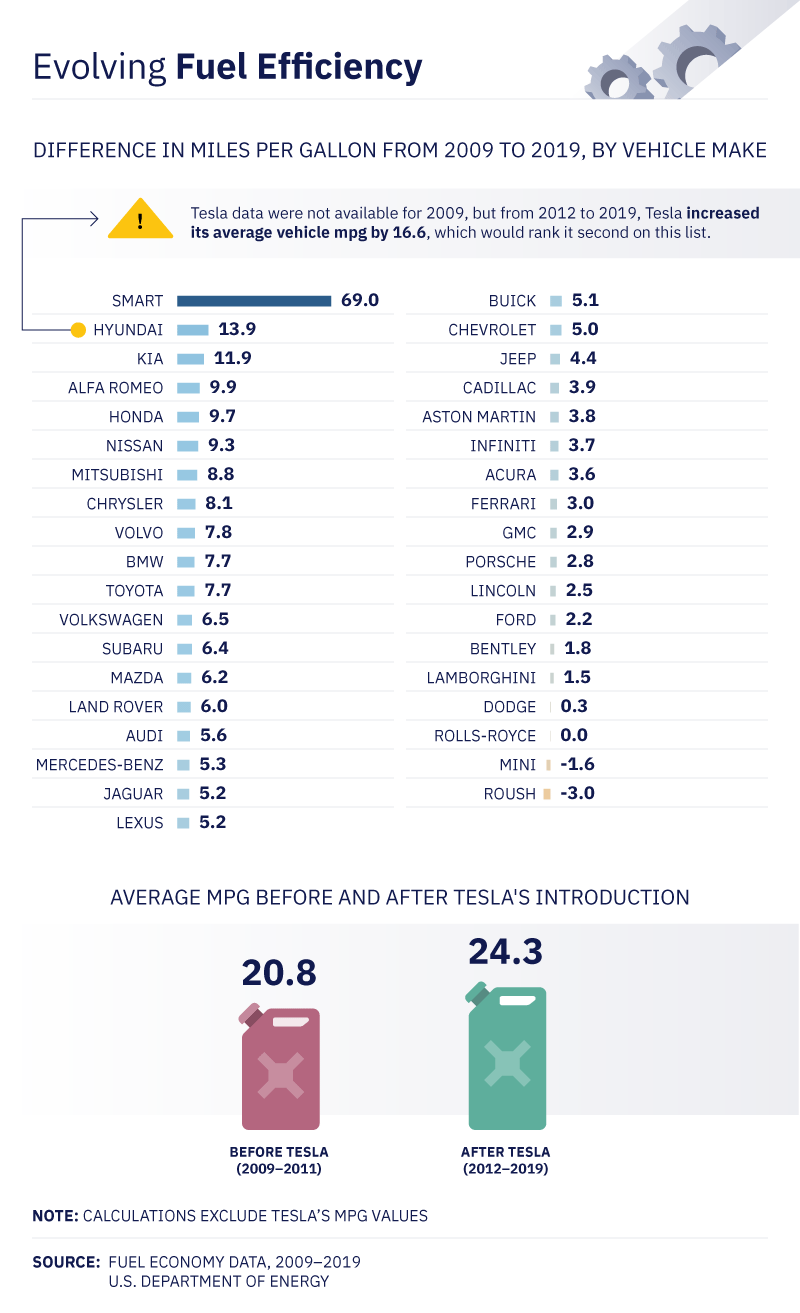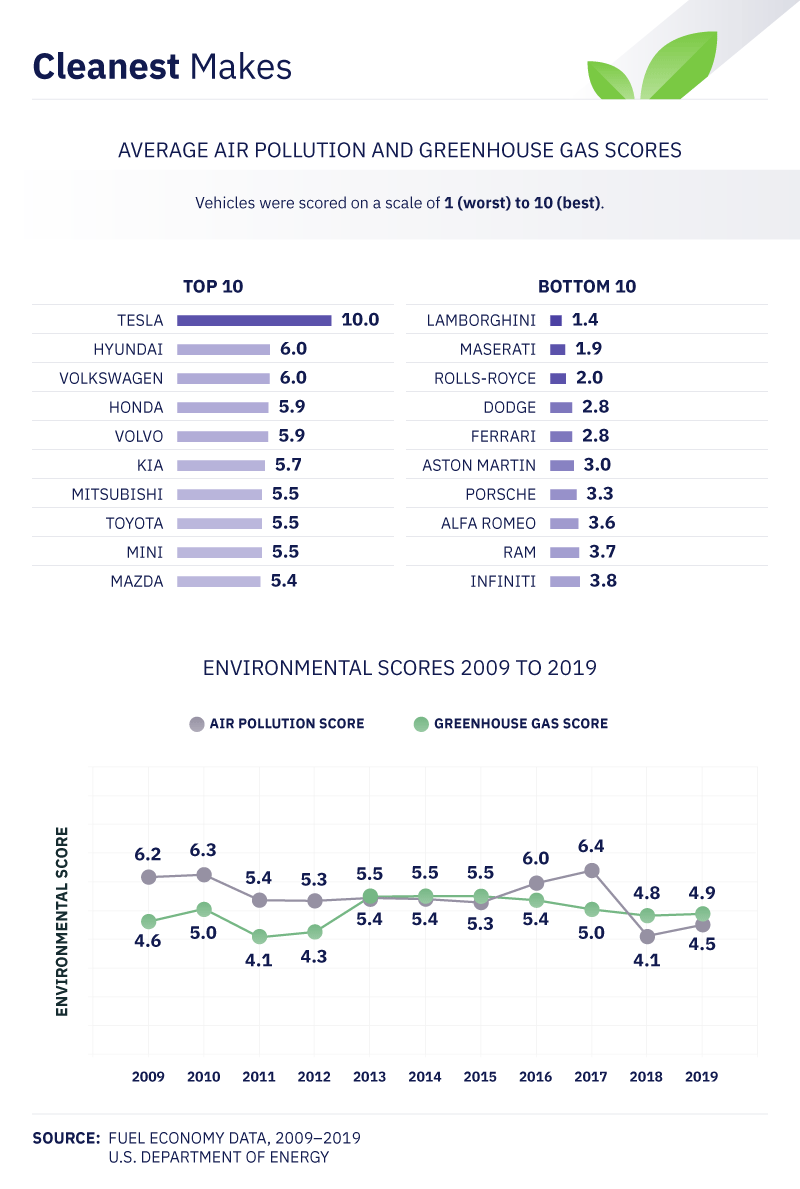Fuel Economy Trends [2025 Update]
Our 10-year study of fuel economy trends finds that fuel efficiency has improved by 6.5 miles per gallon. The use of hybrid and electric vehicles increased by eight percent over the past decade, and Tesla vehicles have the best gas mileage. We conducted our study of fuel economy trends with the information provided by the Department of Energy.
Read more
Free Car Insurance Comparison
Compare Quotes From Top Companies and Save
Secured with SHA-256 Encryption
Chris Harrigan
Former Auto Insurance Claims Manager
Chris Harrigan has an economic degree from Limestone College and an MBA from Clemson University. He previously managed auto insurance claims for Enterprise Rent-A-Car. Currently, he is using his business and insurance expertise to provide insurance data analysis and visualizations to enhance the user experience.
Former Auto Insurance Claims Manager
UPDATED: Mar 2, 2024
It’s all about you. We want to help you make the right car insurance coverage choices.
Advertiser Disclosure: We strive to help you make confident car insurance decisions. Comparison shopping should be easy. We are not affiliated with any one car insurance company and cannot guarantee quotes from any single company.
Our car insurance industry partnerships don’t influence our content. Our opinions are our own. To compare quotes from many different car insurance companies please enter your ZIP code on this page to use the free quote tool. The more quotes you compare, the more chances to save.
Editorial Guidelines: We are a free online resource for anyone interested in learning more about auto insurance. Our goal is to be an objective, third-party resource for everything auto insurance related. We update our site regularly, and all content is reviewed by auto insurance experts.
UPDATED: Mar 2, 2024
It’s all about you. We want to help you make the right car insurance coverage choices.
Advertiser Disclosure: We strive to help you make confident car insurance decisions. Comparison shopping should be easy. We are not affiliated with any one car insurance company and cannot guarantee quotes from any single company.
Our car insurance industry partnerships don’t influence our content. Our opinions are our own. To compare quotes from many different car insurance companies please enter your ZIP code on this page to use the free quote tool. The more quotes you compare, the more chances to save.
On This Page
- Over the last decade, fuel economy trends have shown an increase of 6.5 MPG
- Tesla averages the most MPG for midsize cars, large cars, and SUVs
- In 2011, electric and hybrid cars only made up 2% of all vehicles combined
- Due to drastic growth, these fuel alternatives make up 10% of the market in 2019

The Earth has been in the midst of a climate crisis for decades and, as of 2018, has neared the “critical point of no return.” Scientists have called for immediate and drastic change, concluding that greenhouse gases must be reduced to net-zero by 2050 to limit climate change.
Yet, even in Germany – the “model for solving global warming” – efforts to convert to a low-carbon energy system are likely to fall short. Despite announcing a 40% reduction in greenhouse gases by 2020, the country only reached a 27.7% reduction as of 2018.
And while this feat is nothing short of extraordinary, one problem stands in the way of Germany and every other country concerned with climate change:
From the start of production to fuel costs, air quality, and infrastructure, cars have a huge footprint. But with changes to policies over the years and an increase in knowledge about the impact of automobiles, have vehicles become more fuel-efficient and environmentally friendly?
We analyzed data from the U.S. Department of Energy’s fuel economy database to learn how fuel efficiency has changed over the years. There are plenty of things to consider when buying a car, and it’s time to make the environment one of them.
If you’re on this page, we know that car insurance is likely a priority for you as well. And car insurance, with its tricky terminology and jargon, can be difficult to understand. To learn about the basics of car insurance, check out our car insurance 101 page.
You can also jump right into getting a quote for your fuel-efficient vehicle. Just plug your ZIP code into our FREE online quote comparison tool to find the best car insurance quote in your area based on your information.
In this article, we’ll look at the following topics in addition to the ones already mentioned: EPA fuel economy standards, average fuel economy by year, and fuel consumption by vehicle type.
Now, read on to see which makes and models get the greenlight.
Fuel Economy Improvement by the Year
The standards set by the Environmental Protection Agency (EPA) and the National Highway Traffic Safety Administration under the Obama administration set guidelines to reduce greenhouse gas emissions by raising the average fuel economy of cars, trucks, SUVs, and crossovers to 34.1 miles per gallon by 2016 and 54.5 mpg by 2025. Yet, in 2016, the average mpg was only 25.6. While this is a jump from 20 mpg in 2009, the slow climb has yet to meet those standards.
Despite the current trajectory and numerous manufacturers advocating for stronger mileage standards, the Trump administration is looking to freeze mileage standards at 2020 levels, capping the average fuel economy at 37 mpg.
However, the only vehicle class to even near that level was midsize cars. While pickup trucks were consistently under 20 mpg – increasing by just 1.8 mpg between 2009 and 2019 – midsize cars saw the greatest increase in mpg over the past decade, with an increase of 12.4 miles per gallon.
Compare quotes from the top car insurance companies and save
Secured with SHA-256 Encryption
Most Fuel-Efficient Auto Brands
While the standards set by each president’s administration likely play a role in fuel economy, the popularity of electric cars may play a bigger one. “Miles per gallon” may be misleading when talking about electric vehicles, but by calculating “the number of miles the vehicle can go using a quantity of fuel with the same energy content as a gallon of gasoline,” manufacturers can find the miles per gallon of gasoline-equivalent or MPGe.
When comparing alternative fuel cars, we found that the average electric vehicle releases the same emissions as a vehicle that gets 80 mpg, electric cars impact average mpg levels significantly.
Across all vehicle classes, except for pickup trucks, electric cars had the highest mpg in 2019. Among midsize cars, Tesla dominated with 124.8 mpg – over two and a half times more than the second-leading brand, Hyundai. Tesla also ranked highest for large cars and SUVs, with 104.3 and 90.1 mpg, respectively. But when it came to small cars, Smart was the brand with the highest mpg with 105 in 2019.
On the flip side, manufacturers with the lowest miles per gallon were mainly luxury or sports cars – Bentley had the lowest mpg among midsize and small cars, while Rolls-Royce and Lamborghini had the lowest for large cars and SUVs, respectively.
Regardless of manufacturer, however, pickup trucks had the lowest mpg overall – Honda, Ram, and Ford led the pack, yet no brand reached more than 22 mpg. The class is in for a change, though. Not only has Elon Musk released plans for a Tesla pickup, but Ford has also announced an electric version of the F-150.
While Tesla dominated the chart for mpg across nearly every vehicle class, Hyundai took the lead for electric cars when looking at the highest mpg by engine type. As for the best mpg for gasoline/diesel and hybrid cars, Honda and Toyota topped the chart, respectively.
Read more: Guide to Tesla Car Insurance
Auto Industry Turning to Electric Vehicles
As climate change dominates headlines and “going green” becomes mainstream, electric cars are growing in popularity. But even in 2019, gasoline/diesel vehicles made up 86% of the market share.
Part of the issue can be with car insurance, as some electric cars cost more to insure because they have specialized parts that are expensive to replace. You can see this when looking at the Tesla insurance hike, for instance.
Compare quotes from the top car insurance companies and save Secured with SHA-256 Encryption
Nevertheless, electric cars saw an increase of nearly 1 percentage point between 2018 and 2019 and are expected to make up half of the new cars sold in the next 20 years.
As electric cars become more popular, demand for hybrids may be on the decline. Following a massive spike in market share between 2017 and 2018, hybrids only made up 5.1% of the market share in 2019, closing the gap between hybrid and electric vehicles.
And the near double fuel economy of electric cars may be the reason behind this fall. While hybrids help cut down on fuel consumption and meet the rising demand for greener options, they only come with an average of 54.9 mpg.
Electric cars, on the other hand, come with a 103.7 MPGe. To reduce carbon emissions, this is great.
But there have been questions about how far a car owner can drive these electric vehicles before needing to “refuel” (recharge their batteries). Fortunately, progress has been made in this area. For instance, in our review of the 2018 Chevy Bolt EV, we saw that it can up to 238 miles without a recharge and perhaps even further.
Compare quotes from the top car insurance companies and save Secured with SHA-256 Encryption
The only problem is that electric cars aren’t available in every vehicle class. While there was a pretty even split between electric and hybrid small cars, midsize cars, large cars, and SUVs, hybrids dominated the minivan class. But just as Tesla and Ford have pledged to make pickups more electric, Mercedes-Benz is looking to make a fully electric minivan.
How Auto Brands are Slowly Making Progress
Improving fuel efficiency is no small feat, and while gasoline/diesel vehicles will likely never match the mpg of electric cars, most manufacturers have at least attempted to take steps in the right direction. However, Smart was the only brand with significant differences in fuel economy between 2009 and 2019, increasing its average mpg by 69. This change comes after the brand went all-electric in the U.S. and Canada in 2018 – even beating Tesla.
It’s important to note, however, that Tesla data was not available for 2009. Nevertheless, Tesla ranked second for the difference in mpg, with its average fuel economy increasing by 16.6 mpg between 2012 and 2019. Hyundai and Kia also saw a significant change, with an mpg increase of 13.9 and 11.9, respectively. On the flip side, Rolls-Royce saw no changes during this period, while Mini and Roush actually saw a decline in fuel economy.
Tesla has made waves in the car industry. Since 2009, the average mpg gained was only 6.5, but over half of that increase occurred after Tesla’s introduction.
And seeing as Tesla emerged with little to no competition, nonelectric manufacturers had no choice but to attempt to match its fuel efficiency. Now, car brands are building their own electric vehicles, increasing both Tesla’s competition and the average fuel economy.
Compare quotes from the top car insurance companies and save
Secured with SHA-256 Encryption
The Global Push for “Going Green”
It hasn’t been all uphill for the car industry, though. In 2009, the average air pollution score was 6.2, and the average greenhouse gas score was 4.6. While both averages changed over the years, air pollution scores spiked in 2017, reaching 6.4. In 2018, though, the average air pollution score dropped to 4.1.
Although 2018 was a record year for electric car sales, the reasons behind the stark increase and subsequent drop in air pollution scores remain unclear. But one thing is for sure – if electric car sales follow the expected trajectory over the next two decades, both air pollution and greenhouse gas scores are sure to see improvement.
The Importance of Cutting Fuel and MPG Costs
As cars burn fuel, the emissions they release are wreaking havoc on the environment, and despite stricter regulations in place, the average fuel economy has remained well under 30 mpg.
While there has been little competition for Tesla so far, electric cars will, without a doubt, improve fuel efficiency – helping to limit greenhouse gases.
However, until electric cars become the norm, it’s expensive to own a car, perhaps making it a smarter choice to lease an electric car rather than purchase it outright. Read more in our article about leasing versus purchasing a car.
Compare quotes from the top car insurance companies and save Secured with SHA-256 Encryption
Our goal is to help you cut costs wherever possible while keeping you and your vehicle protected. With a simple search, you can compare car insurance companies, browse hundreds of reviews, and get cheap car insurance quotes all from the comfort of your home. To learn more, visit us online today.
Frequently Asked Questions: Good vs Bad Fuel Economy
Now that we’ve covered fuel trends over the past 10 years, let’ get to your frequently asked questions. They include:
- How has fuel economy changed over the years?
- What is the average fuel economy?
- What car gets 136 mpg?
Scroll down for the answers to those questions and many more.
#1 – How has fuel economy changed over the years?
According to the Environmental Protection Agency (EPA), fuel economy has increased 29% since 2004 for an average of 5.6 mpg per vehicle.
#2 – What is good fuel economy mpg?
This question depends mostly on the vehicle type and where you drive. Many smaller cars, electric cars, and hybrids can get +20 mpg with city driving and over 30 mpg during highway driving. Larger vehicles like SUVs and trucks have lower mpg generally speaking.
#3 – What is the average fuel economy?
In 2020, the EPA predicted that the average fuel economy, with all vehicles taken into account, would be 26 mpg.
#4 – Does mpg improve over time?
Due to technological advances and attempts to reduce carbon emissions which influence global warming, miles-per-gallon has increased across the board for over a decade and a half according to the EPA.
#5 – What car gets 136 mpg?
The Hyundai Ioniq Electric is famous for being the most fuel-efficient car, gaining 150 MPGe (miles per gallon of gasoline-equivalent) for city driving and 122 MPGe for highway driving.
#6 – Is 30 miles per gallon good?
Many electric vehicles are able to surpass the 30 miles per gallon barrier, but for vehicles that rely on gasoline, 30 miles per gallon is decent, whether highway driving or city driving.
#7 – At what speed are cars most fuel-efficient?
According to the Energy Saving Trust, cars are most fuel-efficient between 55-65 miles per hour. This is one of the reasons why vehicles see better fuel efficiency during highway driving versus city driving.
#8 – Does accelerating quickly save fuel?
Yes and no. When a driver accelerates quickly, they pump gas into the engine of the car very rapidly, which causes fuel efficiency to decrease. However, they are also able to reach a cruising speed quicker, which can increase fuel efficiency.
Compare quotes from the top car insurance companies and save
Secured with SHA-256 Encryption
Methodology and Limitations
We analyzed fuel economy data from the U.S. Department of Energy to understand how fuel efficiency has changed over the years. This data includes vehicle makes and sizes, as well as air and greenhouse gas pollution scores, which range from 1 (worst) to 10 (best).
We used the “combined mpg” variable to produce “average” miles per gallon by vehicle make and model. We compared data from 2009 to 2019 to understand how much vehicles have gained in miles per gallon, with very few vehicles losing mpg.
For certain vehicles such as Tesla, we were unable to make 2009-to-2019 comparisons because Tesla data reports were not available that entire time. We did, however, find data as early as 2012, which we used in this campaign.
Fair Use Statement
Most people don’t know what fuel efficiency truly means. Feel free to share our findings with your followers or friends to get the conversation going. The graphics and content found here are available for non-commercial reuse. Just don’t forget to link back to this page to give the author proper credit.
If you’re thinking about buying an electric vehicle, car insurance is likely on your mind. To get your best car insurance rate, just enter your ZIP code into our FREE online quote generator.
Compare quotes from the top car insurance companies and save
Secured with SHA-256 Encryption
Chris Harrigan
Former Auto Insurance Claims Manager
Chris Harrigan has an economic degree from Limestone College and an MBA from Clemson University. He previously managed auto insurance claims for Enterprise Rent-A-Car. Currently, he is using his business and insurance expertise to provide insurance data analysis and visualizations to enhance the user experience.
Former Auto Insurance Claims Manager
Editorial Guidelines: We are a free online resource for anyone interested in learning more about auto insurance. Our goal is to be an objective, third-party resource for everything auto insurance related. We update our site regularly, and all content is reviewed by auto insurance experts.
